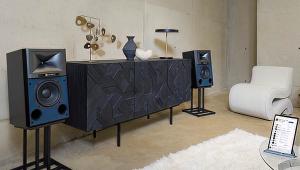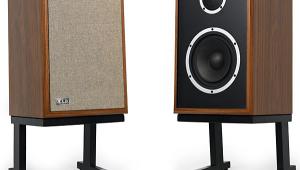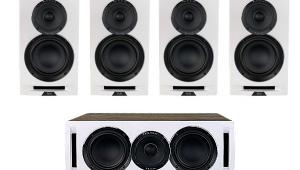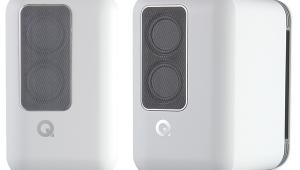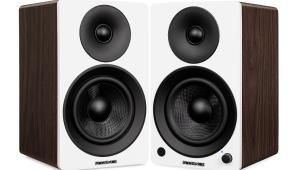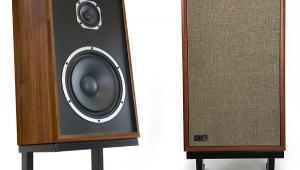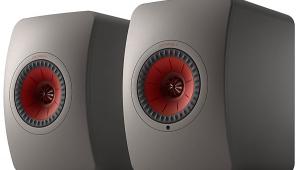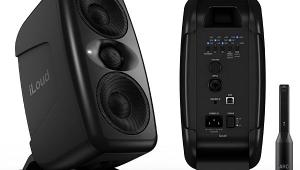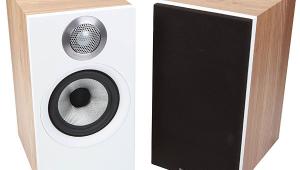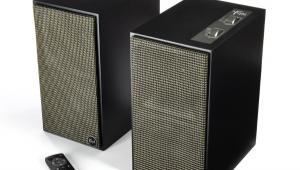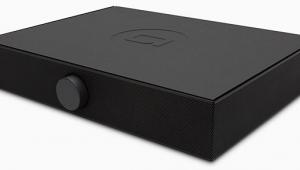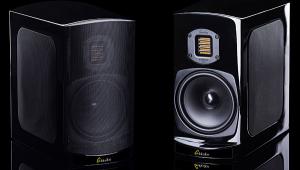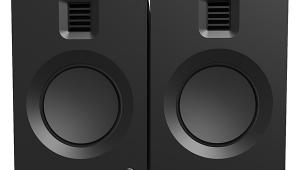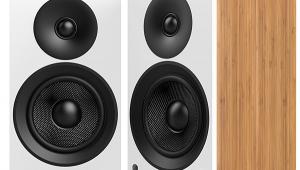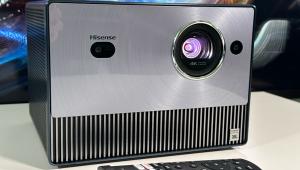Paradigm Reference Studio 20 v.4 Speaker System Page 2
Classical crossover artists are few, far between, and frequently annoying, but I can't imagine anyone not loving Gabriela Montero's Bach and Beyond. The youthful, glamorous pianist states, then eloquently wanders away from, the master's great melodies in a way that evokes Keith Jarrett, but without his trying forays into dissonance and repetition. Montero's improvisations are imaginative, not hokey. The EMI Classics recording takes full advantage of her virtuosity with a nice balance of specificity and space, and the Studio 20 v.4s delivered on their potential, with more harmonic richness in the right hand than I recalled from the v.2s.
Pour Down Like Silver by Richard and Linda Thompson is an album that's always thrilled me to the marrow, even as it's frustrated me with its elusive, reticent, midrange and airless highs. The new Island Remasters CD is somewhat more intelligible than the original British vinyl, but it's otherwise not much improved over Carthage's initial U.S. CD release. What made me pull out my wallet were the four bonus tracks, including previously unreleased live versions of "Streets of Paradise" and "Beat the Retreat" that must have hit stage and studio almost simultaneously. They're agreeably raw and immediate. In the astoundingly emotional cover of "Dark End of the Street," the v.4s kept the low-recorded acoustic guitar from disappearing beneath the luminous vocals. The v.4s didn't need a sub to punch through the world-class rhythm section on the extended live version of "Night Comes In."
If I heard Some Skunk Funk by Randy and Michael Brecker coming out of some doorway at a trade show, I'd be sucked into that room immediately. Telarc's SACD makes full use of the center channel to deliver a tight live performance in 5.1 channels. The effect was most stunning on "And Then She Wept," a slow number with the massed brass of the WDR Big Band Köln floating the trumpet solo. The Studio 20 v.2 always had a winning way with brass instruments—singing, not stinging—and the v.4 is even better, with the same comfortable feel but more detail. On "Levitate," the brass section did indeed seem to float and undulate in the air. I had no trouble hearing Letterman bassist Will Lee coming out of the v.4's 7-inch woofers.
Carlos Franzetti's Songs for Lovers frames his baritone with his own timeless orchestral arrangements—the Buenos Aires–born composer and arranger has also performed the latter function for the likes of Rubén Blades and Paquito D'Rivera. Chesky's CD was recorded in 96/24 PCM stereo, a departure from the company's recent involvement in multichannel SACD. There are times when Chesky's reverb-heavy approach doesn't work for me. With their recent stereo SACD of The World's Greatest Audiophile Recordings, I had to check to make sure the speakers weren't wired out of phase, but here the reverby sound clicks. It subtly enriches the voice, places it against the warm background of the City of Prague Philharmonic, and perfectly integrates both elements. The Studio 20 v.4 achieved greater vocal clarity and presence than the v.2 without adding any sibilance or other unwanted artifacts.
Pirates, Squirrels, and Gangstas
Pirates of the Caribbean: Dead Man's Chest has an amorphous Dolby Digital 5.1 soundtrack that's at its best during ship-to-ship battles. In one brief but magnificent moment, the sea swallows a ship with a huge glug. The hyperactive soundtrack—the orchestral equivalent to the story's frantic, trying-too-hard action sequences—sounds great when masses of bass drums accompany jungle chase scenes. Even sans sub, those drums were full of menace, and the center v.4 didn't miss a single drunken mumble of Johnny Depp's Keith Richards impersonation.
I love that squirrel that showboats the opening scene of Ice Age: The Meltdown. He'd be worth a movie by himself. The panning effects that follow his pursuit of the acorn have already made the Dolby Digital soundtrack a trade-show demo classic, and, with matched Studio 20s across all three front channels, the side-to-side motions were seamless. However, CEDIA and CES exhibitors should also use the ritual dance of the sloths, a chunk of 5.1-channel weirdness that recalls a similarly bizarre vocal-effects classic from Pink Floyd's Ummagumma, "Several Species of Small Furry Animals Gathered Together in a Cave and Grooving with a Pict." The falling ice masses that punctuate the whole movie could have had more very-low-bass impact with a sub but were nonetheless dramatically effective, thanks to the v.4's strong bass response, which is rated down to 54 hertz, plus or minus 2 dB, both on and off axis.
Idlewild features "music by Outkast," as the DVD packaging says in lettering bigger than the names of the stars. André Benjamin plays the brothel pianist and composer who is trying not to drown in a violent, Darwinian world. The music barely tips the hat to the story's roaring-twenties setting, irreverently spanning the generations from Dixieland to rap. Exuberant and stylish, it's one of the best movie soundtracks I've heard in years. Many scenes feature a vamping jazz drummer who's miked so that he sounds like he's a few feet behind the singing and dialogue. The Studio 20s got this spatial detail right and gave the ride cymbal a gentle but realistic metallic hiss.
Mark's New Baby
The Paradigm Reference Studio 20 v.4 occupies a sweet spot in the speaker market: the low end of the high end. If your only experience with loudspeakers is the mass-market junk sold in many national chain stores, stepping up to the Paradigms will give you a true taste of the high end—and you'll never want to go back. If you've already got the megabucks two-channel rig of your dreams but want something surround worthy for the family's home theater, you'll find value here. I've found my new reference speaker. And, when it gets back from the photo studio, I may not bother to reinstall my subwoofer. Years of fun have just begun.
* Audio editor Mark Fleischmann is also the author of the annually updated book Practical Home Theater (www.quietriverpress.com).
Highlights
• Fourth-generation heir to my longstanding reference speaker
• Neutral midrange; strong bass
• A high-end, high-value performer
- Log in or register to post comments
